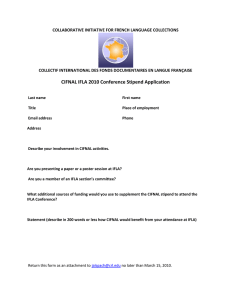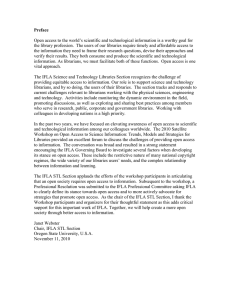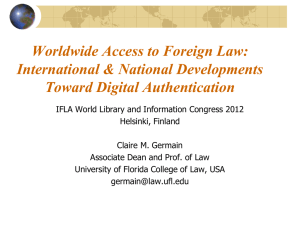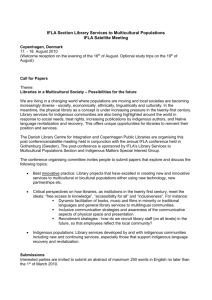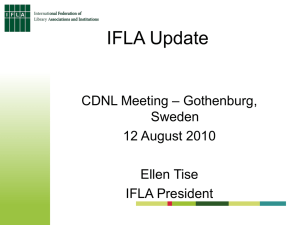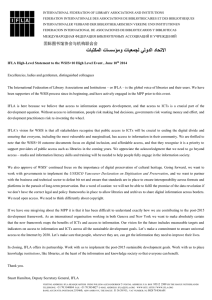IFLA Journal Volume 26, No.1. 2000 ISSN: 0340-0352
advertisement
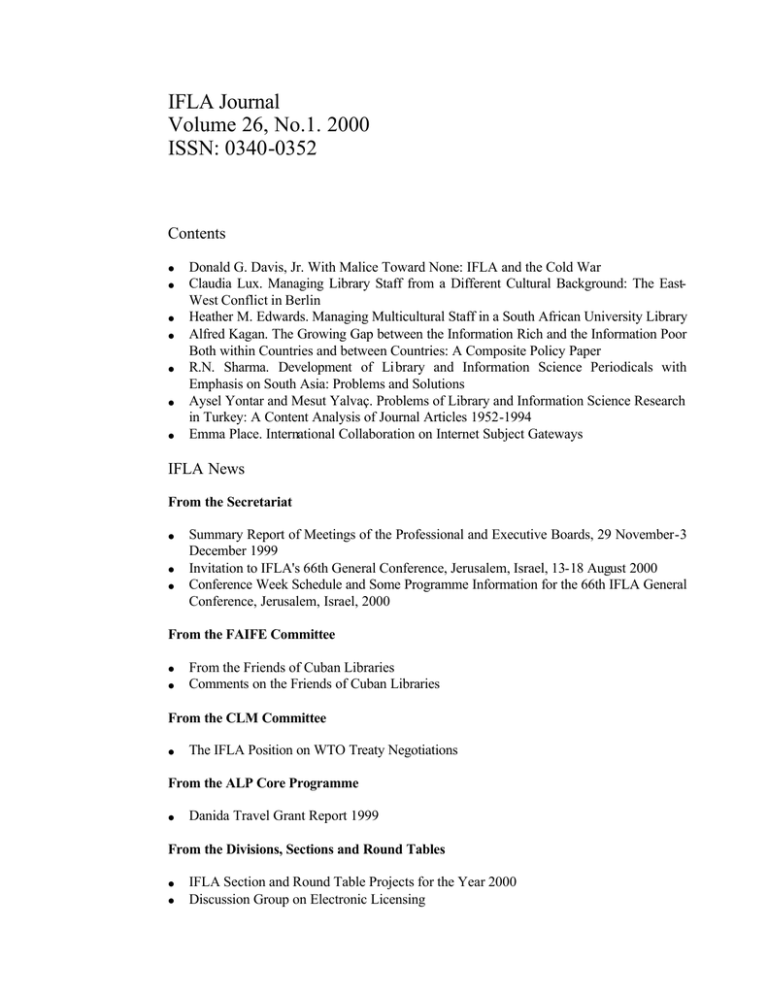
IFLA Journal Volume 26, No.1. 2000 ISSN: 0340-0352 Contents • • • • • • • Donald G. Davis, Jr. With Malice Toward None: IFLA and the Cold War Claudia Lux. Managing Library Staff from a Different Cultural Background: The EastWest Conflict in Berlin Heather M. Edwards. Managing Multicultural Staff in a South African University Library Alfred Kagan. The Growing Gap between the Information Rich and the Information Poor Both within Countries and between Countries: A Composite Policy Paper R.N. Sharma. Development of Library and Information Science Periodicals with Emphasis on South Asia: Problems and Solutions Aysel Yontar and Mesut Yalvaç. Problems of Library and Information Science Research in Turkey: A Content Analysis of Journal Articles 1952-1994 Emma Place. International Collaboration on Internet Subject Gateways IFLA News From the Secretariat • • • Summary Report of Meetings of the Professional and Executive Boards, 29 November-3 December 1999 Invitation to IFLA's 66th General Conference, Jerusalem, Israel, 13-18 August 2000 Conference Week Schedule and Some Programme Information for the 66th IFLA General Conference, Jerusalem, Israel, 2000 From the FAIFE Committee • • From the Friends of Cuban Libraries Comments on the Friends of Cuban Libraries From the CLM Committee • The IFLA Position on WTO Treaty Negotiations From the ALP Core Programme • Danida Travel Grant Report 1999 From the Divisions, Sections and Round Tables • • IFLA Section and Round Table Projects for the Year 2000 Discussion Group on Electronic Licensing • • School Library Manifesto Ratified by UNESCO Round Table on Library and Information Science Journals Reports of Meetings • • • • • • • IATUL Meeting in Crete, 17-21 May 1999 Libraries for the Blind Conference in Malaysia, 19-20 August 1999 INTAMEL Conference, Zurich, Switzerland, 19-24 September 1999 Universal Bibliographic Control and UNIMARC, Tbilisi, Georgia, 3-5 October 1999 Net-ELIS Workshop, Colombo, Sri Lanka, 17-23 October 1999 6th Interlending and Document Supply Conference, Pretoria, 25-29 October 1999 WIPO Standing Committee Meeting, Geneva, 16-20 November 1999 From other Organizations • • • CLIR Project in Brazil US-InterPARES Project 23 April - World Book and Copyright Day From IFLA's Sponsors • Swets and Catchword Form Partnership to Provide Electronic Solutions for Publishers Publications of International Relevance Miscellaneous International Calendar Abstract Sheet With Malice toward None: IFLA and the Cold War Davis, Donald G. Jr. Abstract After surviving the destruction of World War II safely in Bern, Switzerland, IFLA reorganized and began assisting damaged and decimated libraries around the world. It ignored the politics of its member states and allowed and encouraged them to work with each other. The article traces the disagreements among the various factions - including the two dominant ideologies of the world, capitalism and communism - which threatened the foundations of the Federation. Highlighted are earlier debates on the structure of IFLA, and regional representation on the Executive Board. Also included is a survey of the ideological controversies occurring at IFLA Conferences beginning with the 1968 IFLA Conference in Frankfort. Managing Library Staff from a Different Cultural Background: The East-West Conflict in Berlin Lux, Claudia. Abstract After the fall of the Berlin wall in November 1989 the time of euphoria did not last very long. When the staff of the East Berlin City Library and the West Berlin America Memorial Library were united in a new organization called Berlin Central and Regional Library in 1995 the situation had already changed. Misunderstanding or blaming each other were normal habitudes between East and West. To come to a deeper understanding of the staff from a different cultural background was a challenge for the management of the united library. They mainly focused on 12 important points to develop the organization together with the staff. Managing Multicultural Staff in a South African University Library Edwards, Heather M. Abstract South Africa's "apartheid" past has resulted in equity issues currently playing a prominent role in the economic and organizational life of the country, with unfair labor practices and discrimination against minority groups outlawed through new legislation. The University of the Witwatersrand, with a liberal tradition, has equality and diversity issues strongly represented in its Mission statement, and the Library, working to a similar ethic, is actively creating a diverse workforce. Building on a multicultural base that has existed for many years, we are looking carefully at Library staff profiles, and promoting the appointment of black people, especially to senior positions. The Growing Gap between the Information Rich and the Information Poor Both within Countries and between Countries: A Composite Policy Paper Kagan, Alfred. Abstract The IFLA Social Responsibilities Discussion Group was officially established in December 1997 to address the role of libraries in society. This policy paper was developed from six discussion papers prepared for the 1998 IFLA Conference in Amsterdam. The themes of the discussion papers were: rural library development; literacy in libraries; fees for library services; human resource development; the electronic information gap; and North-South library cooperation. Each theme is addressed in turn, including concrete proposals for action. Development of Library and Information Science Periodicals with Emphasis on South Asia: Problems and Solutions Sharma, R. N. Abstract During the present century, Asian countries have been very active in publishing books and journals in the field of library and information science. Journals have been published in English as well as in many vernacular languages. The article deals with the development of Asian library journals, with an emphasis on South Asia. Japan was the first Asian country to publish a library journal, entitled Toshoken Zasshi, in 1907, followed by India in 1912. In 1972 China became the newest and the youngest nation to enter the publishing of library journals. During the last 92 years, many journals have been published from Asia, but many have ceased publication, for various reasons. As present, over 200 journals are published in Asian countries. As recently as 1998, a new quarterly journal, entitled Ranganathan Research Bulletin, started publication in India. The article discusses the coverage, quality of articles, readership, and subscription rates of various South Asian library journals. It also deals in brief with the success of Library Times International, edited by this author. Finally, a few suggestions are made to improve quality, circulation and coverage, and attract readership for all library journals in a timely manner through technology. Problems of Library and Information Science Research in Turkey: A Content Analysis of Journal Articles 1952-1994 Yontar, Aysel and Mesut Yalvaç. Abstract The article provides a content analysis of the LIS research articles published in the journal Türk Kütüphaneciligi (Turkish Librarianship) between 1952 and 1994. A total of 517 professional articles and 127 research articles were analyzed. Research and professional articles are analyzed by topic. In addition, research articles are analyzed by organizations, by research strategies and by methods of data collection used. The analysis is based on the classification schemes of Järvelin and Vakkari (1990 and 1993), and includes comparisons and data from an earlier study conducted by Yontar (1995) on an analysis of graduate theses produced by three departments of library science in Turkey between 1958 and 1994. International Collaboration on Internet Subject Gateways Place, Emma. Abstract A number of libraries in Europe are involved in the development of Internet subject gateways - services that aim to help users find high quality resources on Internet. Subject gateways such as SOSIG (Social Science Information Gateway) have been available on the Internet for some years now, and they offer an alternative to Internet search engines such as Altavista and to directories such as Yahoo. Distinctively, subject gateways draw upon the skills, practices and standards of the international library community and apply these to Internet-based information. This paper will suggest that librarians are ideally placed to play a major role in building Internet resource discovery services and that subject gateways offer a means to do this. It will outline some of the subject gateway initiatives in Europe and will describe the tools and technologies developed by the DESIRE project to support the development of new gateways in other countries. It will also discuss how IMesh, a group for gateways from around the world, aims to work on an international strategy for subject gateways and on developing standards to support this.
